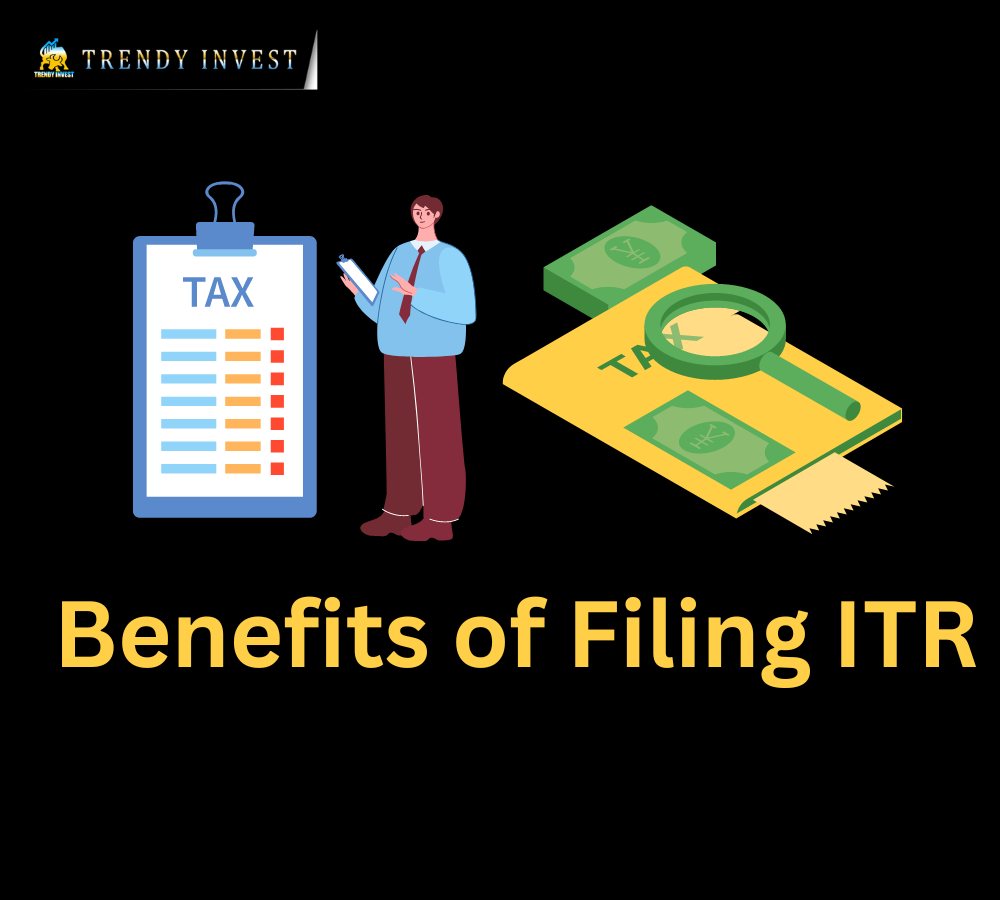People in India are subject to income taxes that are determined by the tax bracket they are in. People are always looking for ways to avoid paying income tax. They do not, however, gain from salary optimization. As a result, if your income rises, so do your tax liabilities.
The details of a taxpayer’s income, the tax owed on that income, exemptions, and deductions are declared in an income tax return for a certain fiscal year. ITRs must be filed by taxpayers for a variety of reasons, but the major one is to make tax deduction claims.
To clarify the benefits of filing an income tax return and answer any additional questions a taxpayer may have, we give a complete overview of income tax returns in this blog. Every facet of ITR advantages will be covered, including who needs to submit an ITR and what happens if they don’t. So, let’s begin right away!
Significance of Income Tax Return
You utilise an Income Tax Return (ITR) form to provide information about your earnings and taxes to the income tax office. Based on the taxpayer’s income, the amount of tax that must be paid is calculated. If the return shows that an excessive amount of tax was paid throughout the year, the person will be eligible to receive an income tax refund from the Income Tax Department. A return must be filed annually by everybody or any business that gets any income during a fiscal year.
Salary, business profits, real estate rental income, dividends, capital gains, interest payments, and other types of income are all possible sources of the money. Tax returns for both individuals and businesses must be submitted by a specific deadline. If a taxpayer misses the deadline, they must pay the penalty.
Who is Eligible to File Income Tax Return?
Only those individuals or entities that fall under certain income brackets are mandated to pay income tax, according to the Income Tax Act. The following is a list of entities or enterprises that must completely comply and file their ITRs in India:
- This tax applies to anyone under the age of 59 with an annual income of more than 2.5 lakh. For senior persons (aged 60 to 79), the maximum increases to 3 Lakh, and for super senior citizens, to 5 lakh (aged 80 and above). It is important to keep in mind that the amount of income should be calculated before any Sections 80C through 80U deductions and other Section 10 exemptions are applied.
- Along with those who want to submit an ITR and those who want a refund for any overtaxes deducted for income taxes paid, registered firms that generate revenue regardless of whether they made a profit throughout the year are also required to do so.
- Along with NRIs who generate more than 2.5 lakh in income or accruals during a single fiscal year and foreign companies that benefit from agreement advantages on transactions conducted in India, individuals with assets or financial stakes in organisations based outside of India are also eligible to file for an ITR.
- It is not necessary for everyone to submit an ITR, though. If a person’s taxable income for a fiscal year exceeds the 2.5 Lakh exemption threshold, they must file an Income Tax Return (ITR). An individual does not have to file a NIL tax return if their gross income is below this exemption threshold. Even if it is below the minimum level, it is still advisable to file a tax return for a number of reasons. If you received any income during the fiscal year from any source, you should always file a tax return.
Top 10 Benefits of Filing Income Tax Return in India
1. Genuine Proof of Your Earnings
Employers frequently provide Form 16 to their staff members as verification of pay. The ITR Filing form is used by independent contractors and self-employed people to really verify their income. It contains a detailed summary of a person’s earnings and outgoings for the complete fiscal year.
2. An Important Loan Application Document
When you apply for a loan to buy something, such as a car or a new home for your family or business, the bank asks for specific paperwork from you. Documents like Aadhar Cards, PAN Cards, licences, photo identification, etc., may be needed. Your income proof is another crucial document that is required. Banks usually asked for ITR for the prior three years. This is done to ascertain whether your history and present financial situation will allow you to repay the loan. ITR might be helpful when applying for a credit card as well as when asking bank loans. Credit card firms will also inquire about your former earnings and tax return prior to providing you a credit card.
3. Excess TDS Claim
Even if your income is not taxable, tax might still be deducted from your wage, fixed deposit, or any other source. The bank is required to deduct 10% tax from this amount if your total income is less than 2.5 lakhs but you received 1 lakh from an FD. In this case, the tax that was withheld by submitting an ITR can be reimbursed. Simply put, in order to recoup any TDS that was deducted at the source, a person must file a tax return.
4. Visa Application
If ITR paperwork is submitted with the application, the chances of it being denied or marked as problematic lessen. The tax return demonstrates the individual’s sense of civic duty. Due to growing security concerns, a number of nations now need ITR for visas. For instance, when applying for a Schengen Visa, you must submit the returns from the preceding three years even if you had no income during those three years.
5. Record of Losses
Even if the loss is NIL, you must still file a return if you want to carry over the loss from the stock market from the prior year. Whether or whether you make a profit, you should file an ITR if you want to offset those capital losses. A person must also file an ITR in compliance with income tax requirements if they own overseas stocks.
6. A Reliable Proof of Address
The Income Tax Return is acceptable as proof of address. Using it, one may even obtain an Aadhaar Card. Address proofs are necessary for all identification documents, including Aadhar Cards, licences, passports, and similar ones. These documents frequently do not accept widely used forms of identification like ID cards. In such circumstances, your income tax return may be used.
7. For Purchasing High Coverage Insurance
A lot more individuals are buying life insurance plans for more than 50 lakhs. Insurance providers, however, won’t take it until you provide them with your ITR documents, which demonstrate your yearly income. Your level of coverage will depend on your working income, and ITR informs the insurance provider that you are highly compensated.
8. Startup Venture Funding
If you want to start a new business or expand an existing one, you could need money from outside investors like venture capitalists or seed money. These investors could enquire about the specifics of your ITR to assess the viability and stability of the company’s finances. They could also use your ITR forms to double-check the information in the audited report.
9. Scholarship Advantages
An ITR is viewed as a source of income documentation by many authorities (both government and private). To apply for specialised institute and/or university scholarships, for example, you can submit an ITR. The ITR helps determine whether a prospective student can demonstrate their potential to earn money, and insurance companies also recognise them as legitimate identification.
10. Advantages for Professionals & Independent Contractors
Independent contractors and self-employed people do not receive Form 16. Frequently, their ITR is the only document proving they filed income taxes. Without this proof, they might encounter funding and transactional concerns.
Importance of Filing Income Tax Return
Many seem to think that submitting tax returns is optional and so reject it as unnecessary and onerous. This is not a very ethical way to look at tax preparation. Every year, everyone who is a responsible citizen of the country is expected to file their taxes as part of their moral and social responsibilities. It provides the assessee with a platform to occasionally request refunds in addition to other forms of relief and acts as the foundation upon which the government computes the amount and means of citizen spending.
Consequences of Not Filing Income Tax Return
Now that you are aware of the advantages of filing an income tax return, think about some of the consequences of not doing so:
- A notice will be given to the individual if they fail to file income tax.
- If someone is unable to submit Income Tax Returns for a valid reason, the official body i.e., Income Tax Department will accept a legitimate reason and any required supporting proof. They might ask for a reprieve from condonation in this circumstance.
- If an individual files their ITR after the deadline, the IT Department will impose a penalty. In general, if one’s income is beyond 5 lakhs, they must pay a Rs 10,000 penalty. If income is less than this amount, the penalty is Rs 1,000.
- In extreme situations like tax evasion, assessees may experience harsh detention.
- Yet, some people are not required to file an income tax return. The Union Budget for 2021 included a statement from the finance minister stating that seniors who are 75 years of age or older can be fully excluded from filing ITRs.
Conclusion
As you may have realised by this time, there is no excuse for you to avoid filing your yearly ITR. Make timely tax payments and file your returns. The benefits are what really make a difference. Last but not least, this blog is produced for public consumption and is simply meant to be informative and instructive.








90 thoughts on “<strong>Top Benefits of Filing Income Tax Return</strong>”
An intriguing discussion is definitely worth comment. I do believe that you need to write more on this subject matter, it might not be a taboo matter but typically people dont discuss such topics. To the next! All the best!!
order viagra online cheap
lisinopril swelling
what happens if you drink on flagyl
zoloft 75 mg
furosemide weight monitoring
gabapentin dose for 70 lb dog
zithromax during pregnancy
cephalexin dosage for cats
amoxicillin para que sirve
are citalopram and escitalopram the same
cephalexin for kids
ciprofloxacin hcl 500mg tab
bactrim vs cipro
does cephalexin treat staph
amoxicillin buy
bactrim dosage 800/160
escitalopram 10 mg used for
neurontin interactions
medication depakote
ddavp ingredients
cozaar davis pdf
bupropion and citalopram
generic depakote
ddavp onde comprar
cozaar walmart price
10mg citalopram to 50mg sertraline
topical diclofenac
diltiazem side effects mayo clinic
amoxicillin clavulanate augmentin
flexeril and norco
flomax intermittent use
reddit contrave
aripiprazole high
is it ok to give my cat baby aspirin
amitriptyline dosage for pain
allopurinol and blood pressure
baclofen 10 mg
augmentin side effects in adults
buspar vs bupropion
celebrex high euphoria
ashwagandha dangers
how long does celexa stay in your system
buspirone alcoholism
celecoxib contraindications
lowest dose of semaglutide
acarbose fda
abilify restlessness
actos almudena
can you take ibuprofen with robaxin
protonix pregnancy category
repaglinide farmacodinamica
how long does remeron take to work
how does robaxin help with opiate withdrawal
spironolactone 12.5 mg tablet
sitagliptin uti
Thanks for sharing. I read many of your blog posts, cool, your blog is very good.
synthroid cellulite
how much tadalafil should i take
is levitra still available
cialis time
levitra purchase cheap
cheap generic cialis
cheap generic levitra online
modula tadalafil reviews
indian pharmacy tramadol
most trusted online pharmacy
how long does 100 mg sildenafil last
Thanks for sharing. I read many of your blog posts, cool, your blog is very good.
uk online pharmacy propecia
digoxin pharmacy protocol
vardenafil professional 20 mg
tadalafil lowest price
vardenafil 40 mg india
where to buy tadalafil online
tadalafil 50mg
Can you be more specific about the content of your article? After reading it, I still have some doubts. Hope you can help me.
vardenafil 40mg
tadalafil use in females
vardenafil hcl 20mg
tadalafil 20mg india
Co-Amoxiclav
how much does cialis cost at a pharmacy
can you buy viagra from a pharmacy
publix pharmacy free lisinopril
no prescription oxycodone online pharmacy
renova pharmacy
zyban online pharmacy
Thank you for your sharing. I am worried that I lack creative ideas. It is your article that makes me full of hope. Thank you. But, I have a question, can you help me?
Your article helped me a lot, is there any more related content? Thanks!